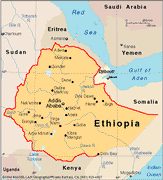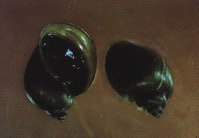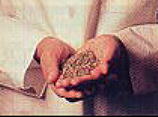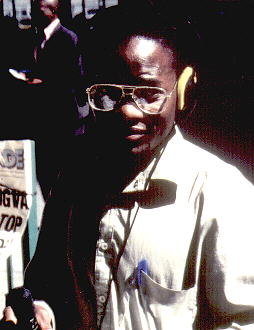
A
WORD FROM RBO's EDITOR:
We are pleased to have
many visitors from around
the world on this page.
Please, feel free to
download the audio-file
and to use it cost-free.
However, this will be
under the condition that
you inform RBO about
intended use by sending a
mail to: radiobridge@aol.com
Any other feedback would
also be appreciated.
The copyright remains
with RBO. |
"MAKING
IT WORK"

IN ETHIOPIA

Children
infected with
schistosomiasis
Schistosomiasis, also
known as bilharziasis in
some endemic areas, is
the second most prevalent
tropical disease, after
malaria, and is a leading
cause of severe morbidity
in many parts of the
world.

Click
on the snails,
and the World Health
Organisation (WHO)
will explain to you more
about this disease.
Endod (Phytolacca
dodecandra), commonly
known as the African
soapberry plant, is a
perennial that has been
selected and cultivated
for centuries in many
parts of Africa, where
its berries are used as a
laundry soap and shampoo.
Endod is synonymous with
"soap" in many
African countries. People
of the Ethiopian
highlands, for instance,
use Endod berries to
launder their traditional
shamas, the glistening
white shawls
characteristic of the
region. The fish-killing
property of Endod is also
well known and,
traditionally, people in
rural communities use
Endod as an intoxicant to
collect edible fish.

Dr.
Aklilu Lemma with
Endod-berries
Click on the picture to
learn more about him.
In 1964, while conducting
field work in his native
Ethiopia, biologist
Aklilu Lemma observed
that downstream from
where people were washing
clothes with the
soapberry plant, dead
snails were found
floating in the water.
After several years of
intense research, Dr.
Lemma discovered that the
sun-dried and crushed
Endod berries were lethal
to all major species of
snails but not harmful to
animals or humans, and
completely biodegradable.
Over almost 30 years Dr.
Lemma's goal has been to
develop Endod as a safe,
low-cost alternative to
expensive chemical
molluscicides. In
addition to effectively
controlling
disease-carrying snails,
Dr. Lemma viewed Endod as
a traditional African
plant that can be
developed as a
capacity-building
technology by and for
African communities. In
the words of Dr. Lemma: "Through
the development and use
of simple, appropriate
agronomic techniques and
extraction and
application procedures,
people could easily grow,
process locally and use
Endod products to control
schistosomiasis on a
community self-help
basis."

Unfortunately, Dr.
Lemma's 29-year quest to
see Endod widely used in
Africa has been
repeatedly stalled by
international regulatory
obstacles. Despite
rigorous toxicological
studies performed by
Lemma over the course of
two decades, the World
Health Organization
disregarded Lemma's
research (and the
traditional wisdom of
people who have used
Endod for centuries),
insisting that the
scientific analysis
conducted in Ethiopia be
repeated under
standardized "Good
Laboratory
Practices" by
internationally-recognized
institutions.

Endod:
A Case Study of the Use
of African Indigenous
Knowledge
to Address Global Health
and Environmental
Problems
Dr Lemma
observed: "We have
learned the hard way that
the root problems of
scientific research in
Africa are not only the
lack of adequate
facilities and funds, but
also the biases and
reservations of some
individuals and
organizations in
industrialized countries
who find it difficult to
accept that any good
science can come from our
part of the world...
Also, except for
occasional lip service,
little credit is given to
the wisdom of traditional
societies in their
ability to select, over
long periods of time,
such natural products as
Endod for their continued
and demonstrably safe
use."

Dr. Aklilu
Lemma died on April 5th,
1997
One of his
students, herself from
Africa, dedicated a poem
to him
GEORGE
MSUMBA OF RBO

REPORTING
FROM ETHIOPIA
"How
to prevent the bilharzia
disease
by treating your water in
lakes and rivers
with powder you can grow
in your fields"
14'57" / LISTEN

You can go
back to the introduction
page by hitting the
button above.

You can go to the next
episode by hitting this
button,
or you access episodes of
your choice by clicking
on one of the thumbnails
below.


|